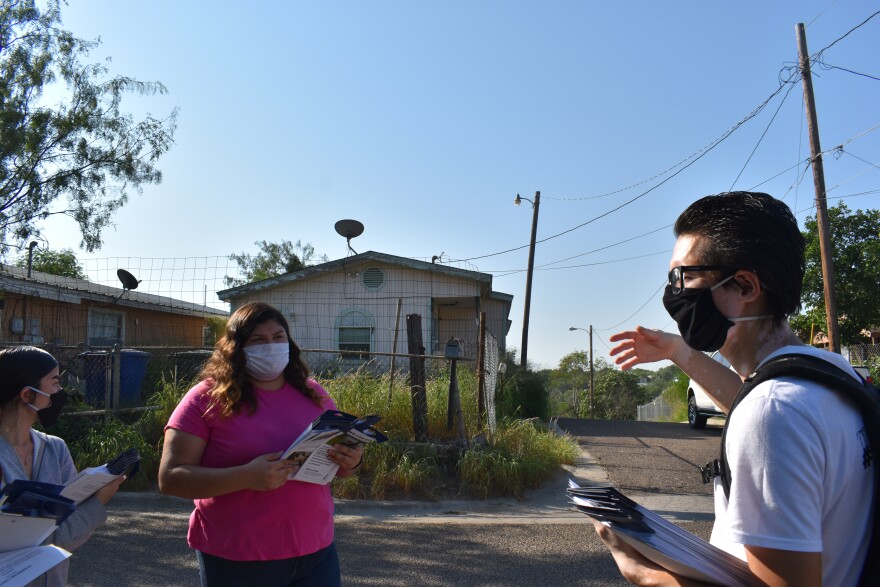The No Border Wall Coalition in Laredo reminded residents along the Rio Grande that they could soon face a border wall, depending on who becomes president.
Juan Ruiz handed a group of volunteers some flyers with information about the proposed border wall along with a Biden and Harris campaign flyer on Saturday morning.
“We’re also trying to get people to realize that the election is already taking place, and that voting begins next week, the 13th,” he said.
President Donald Trump has been pushing for a border wall in Laredo for more than a year now. In February of 2019, he declared a national emergency to move $3.6 billion dollars from military construction funds to several border wall construction projects, including in Laredo and El Paso.
On Friday, the Ninth Circuit Court of Appeals ruled the move unlawful, following a challenge from the American Civil Liberties Union. That could prevent some construction in the Laredo area, according to Tricia Cortez of the Rio Grande International Study Center and the No Border Wall Coalition.
But Trump also diverted $2.5 million from military pay and pension funds for his border wall projects, and those projects have continued under pending litigation.
The No Border Wall Coalition plans to reach out to voters throughout this month in neighborhoods and parks that they fear could be hurt by the construction.

On Saturday, they walked through the El Azteca neighborhood, where family homes and affordable senior apartments overlook the Rio Grande. It’s one of Laredo’s oldest neighborhoods, but it’s also one of the poorest.
As volunteers left flyers on fences and doors, Ruiz explained to them that the wall could be built right through the area.
“There’s this misconception that the landowners and landowners coalition are wealthy ranch owners that don’t want to give up miles of their riverfront property,” Ruiz said. “But you know it’s not just that. The story doesn’t end there. There are hundreds of people that don’t have access to the resources they have.”
Felipe Perez, a 92-year-old deaf resident, is one of those landowners.
“It’s not right. I don’t think it’s right,” he said in Spanish. “We don’t want it.”

Since June, Ruiz has reached out to landowners to inform them of their rights as the government tries to access their land. Some have fought the government in court, but many landowners in this area have signed off on right of entry, one of the first steps in the process for federal land acquisition.
The federal government hasn’t yet finished acquiring the needed land to build the wall in this area. That gives Ruiz and the coalition hope that a change in the Oval Office could halt construction scheduled to begin as early as January.
Perez said he planned to cast his ballot. He’ll just need help getting to the polls.
“I have to vote,” he said in Spanish.
“You see the height of those apartments. That’s how high they want to make the wall,” Tannya Benavides said in Spanish to a lady at her front door step.
Benavides said she volunteered because she spent part of her childhood here. Webb County has historically low turnout, but she thought the border wall could mobilize more people to vote.
“I think people’s minds’ can shift, and they need to start seeing their vote as the power to change that,” she said.
But they weren’t the only ones campaigning. Trucks with Trump flags passed by the neighborhood on their way to a car caravan.

